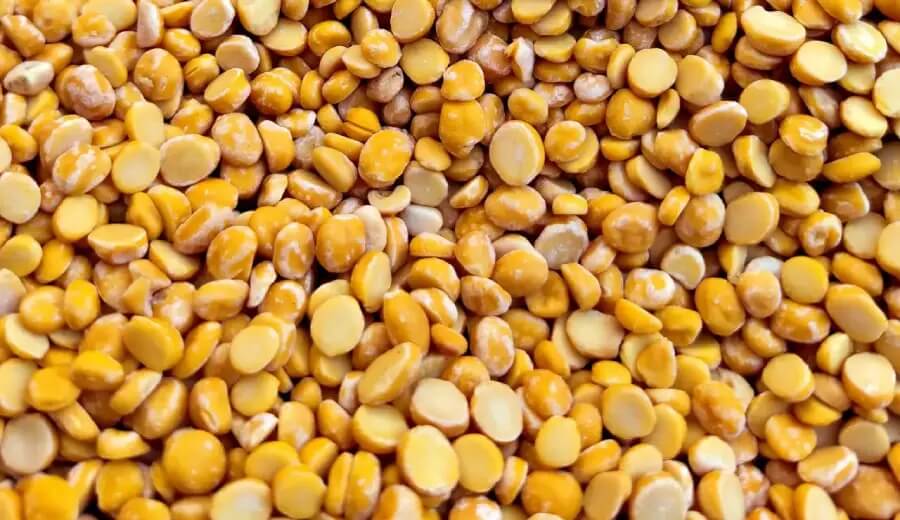
Yellow peas are a nutrient-rich legume with wide-ranging applications across traditional cooking and modern plant-based food manufacturing. With their smooth texture and mild, earthy flavor, yellow peas are a staple in soups, purées, and vegan proteins. Nutrada connects you with experienced yellow pea suppliers offering consistent quality in whole, split, and flour formats, ideal for bulk sourcing, foodservice, and private label development.
Yellow peas (Pisum sativum) are field peas that are harvested when fully ripe and dried so that they maintain their golden color. When cooked, they have a creamy texture and are often used in food products like soup, stews, and various regional dishes.
Their mild flavor and high protein content make yellow peas also a popular ingredient in plant-based foods. An example of this is pea protein isolate, which is used as a meat substitute by vegans. While yellow peas are similar to green peas, they are also compared to white peas and marrowfat peas based on how well they cook or mill. Compared to chickpeas, yellow peas have a milder taste.
Yellow peas are available in different types, each suited for specific cooking and business uses:
Buyers can select the type of peas based on their usage. This helps create the best products in business applications.
Yellow peas are usually planted in spring and harvested from late summer to early fall, depending on the area. After they are harvested, they are cleaned, dried, and sorted. This process helps keep them stable on shelves and ready for shipping around the world. Because yellow peas last a long time and can be stored in bulk, they are a regular ingredient for manufacturers and processors all year long.
The main countries producing yellow peas are:
Canada has long been the leading exporter of yellow peas, particularly to China and India. However, by 2023, Russia has started to export more yellow peas to India than Canada. This shows shifts in global trade driven by price and logistics.
Yellow peas have been grown for many years and are still important in diets across Europe, Asia, and North America. Recently, they have become popular in the plant-based food movement. Some market factors that have caused this, are:
In 2023, the global pea market, which includes yellow peas, was worth $6.3 billion. It is expected to grow by 4.5% each year, reaching $8.9 billion by 2030. Trends such as preferences for natural products, diverse protein sources, and changes in trade, are affecting buying habits. Prices for yellow peas can vary, with Russia often offering lower prices than Canada, which helps them compete globally.
Nutrada offers easy access to certified producers of yellow peas. These peas come as whole, split, flour, and flakes. They are packed in multi-layer bags that weigh between 10 to 50 kg. The yellow peas from Nutrada's suppliers include full traceability, Certificates of Analysis (COAs), and documents for pesticide and microbial testing.
Bulk formats work well for large food producers, soup makers, and plant-based protein developers. You can request specific features like origin, certifications and minimum order quantity to meet your production needs.
Are you looking to create your own yellow peas product? Nutrada connects you with private label suppliers who offer ready-to-use options in 100g, 250g, and 500g pouches or jars. Our partners usually provide help with labeling, packaging design, and make sure their product meets (local) regulations.
Organic yellow peas are grown without artificial chemicals and follow organic guidelines. They are available as whole peas, split peas, or flour. The packaging keeps them safe from light and moisture, ensuring they stay fresh for worldwide shipping.
If you need yellow peas for processing, private label packaging, or certified organic options, Nutrada connects you with approved peas suppliers. Use Nutrada to find yellow pea suppliers and make your sourcing process easier, reliable, and traceable.